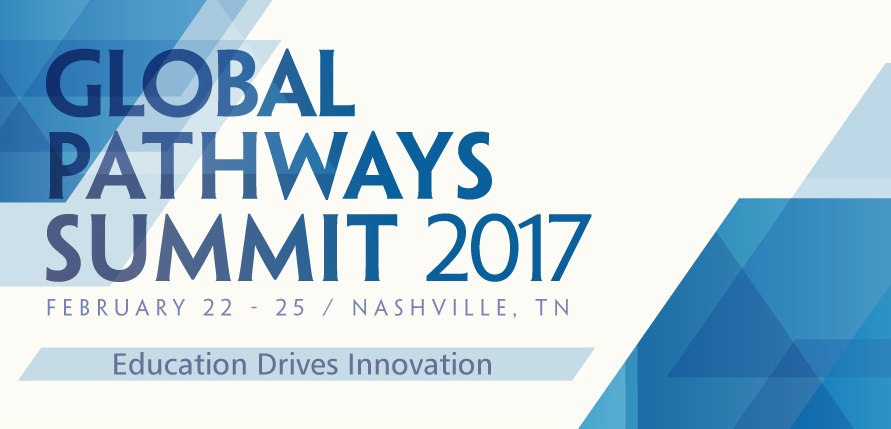CONCURRENT SESSIONS II 12:30 – 1:30 p.m.
How We Can Better Assist First-Year International Students in Tennessee through First Year Experience Program? *interpretation provided
Location Library Community Room
Presenter Takeo Suzuki, Executive Director, Office of International Programs, University of Tennessee at Chattanooga
Summary According to Open Doors Date (2016), there are 1,043,839 international students studied at U.S. colleges and universities, and the number of international students studying in the US grew by 7.1% over the prior year and is now a record high. While many other states saw the positive increase in international student enrollment figure, the state of Tennessee lost 4.3% of international students now, there are 9,094 international students.
From what I experience by working with international students as executive director, many international students count on their friends when they have issues and challenges about their academic and social life in the U.S. The First Year Experience course designed for international students will be beneficial since it will introduce important aspects of being a successful students in the U.S. Hegarty (2014) note “essential to accustoming students to American life is to integrate students quickly into college life so as to avoid feelings of alienation” (p. 228).
This session will explain the importance of first-year academic program for international students by identifying currents trends and issues and will suggest what each campus can/should do increase, retain and graduate international students in Tennessee.
Reference:
Hegarty, N. (2014). Where We Are Now –The Presence and Importance of International Students to Universities in the United States. Journal of International Students, 4(3), 223- 235.
Learning Objectives
This session will explain the importance of first-year academic program for international students by identifying currents trends and issues and will suggest what each campus can/should do increase, retain and graduate international students in Tennessee.
Cultural Exchange and Academic Mobility
Location Buttrick Hall Room 123
Presenters
Michael Cooper, General Director, Centro Colombo Americano Medellín
Luisa Mejia, Special Projects Director, Centro Colombo Americano Medellín
Summary The Centro Colombo Americano .of Medellin (CCAM) is a nonprofit organization that furthers human development through academic, multicultural experiences among Colombia, The United States, and other countries. The CCAM does this by bringing culture and art from the United States to share with the local community. Traditionally, U.S. music groups that toured the country were professional musicians sponsored by the U.S. State Department. When funding priorities changed, U.S. universities became the perfect partner to bring American Culture to Colombia.
Learning Objectives
1. Learn about Binational Centers in Latin America
2. Learn about the possibilities of increasing international academic mobility by developing cultural exchange programs
3. Learn about partnering with community organizations and city government to bring international culture to your community.
Benefits of Working with a Network of Universities
Location Library Room 418A
Presenter Marcela Wolff Lopez, Director, International Relations, EAFIT University
Summary Colombia Challenge Your Knowledge is a collaborative of the network of accredited universities of Colombia, the Ministry of Education, ICETEX, Proexport, Colciencias and other strategic national allies to promote Colombia as a destination for academic and scientific collaboration. CCYK’s main objectives are to promote and disseminate Colombian research, academic and outreach programs abroad, strengthen the internationalization of the Accredited Universities of Colombia, study current trends in internationalization, and promote quality processes in all Colombian higher education institutions. CCYK promotes active collaboration between Colombian Universities, converting our country into a diverse and increasingly integrated campus for national and international students, as well as a relevant and reliable partner for international education programs.
Learning Objectives
1. Learn about Colombian HEIs
2. Share an effective collaboration model
3. Learn about the benefits of working as a network
UNIMINUTO in Africa: Establishing Higher Education Initiatives and Exchanges that Promote Human Development
Location Library Room 800BB
Presenter Mauricio Izquierdo, Head of International Affairs, Uniminuto University
Summary Minuto de Dios Corporate University -UNIMINUTO- began its academic activity back in 1992. Since then it stands out as an inclusive and sustainable institution, staked by a culture of relevant and quality education widely spread throughout the country (with more than 120 K students in more than 70 campuses all over the country) for its easy access and use of ICT promoting initiatives for social innovation and cooperation for development. From this scenario, the case study presented aims to analyze the benefits of implementing proposals for international cooperation through the exchange of knowledge in higher education initiatives for the promotion of human development, as well as envisioning the pros and cons from encouraging such developmental projects meant to better the quality of life for their citizens. Hence, UNIMINUTO, within her action framework in the midst of international cooperation, championed the establishment of its educational model in Ivory Coast, a country that, although in the same developmental phase as Colombia, presents some of the biggest needs that the Eudist Organization wants to attend from the viewpoint of her dedication to human promotion through education and as well from the standpoint of the community’s principles.
Learning Objectives
Social innovation and cooperation for development.
